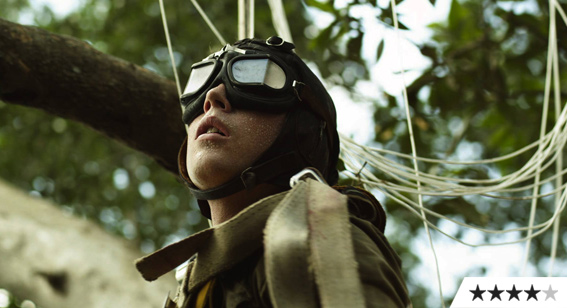Review: Canopy
Abandoning traditional narrative in favour of a formally experiential endeavour, Aaron Wilson’s ambitiously minimalist Canopy yields qualities both oblique and visceral as it tracks the efforts of an unnamed Australian airman (Khan Chittenden) to survive the rainforests of war-ravaged 1942 Singapore after being shot down. Over a slow-burning 75 minutes, Wilson surrenders completely to texture, immersing us […]

Abandoning traditional narrative in favour of a formally experiential endeavour, Aaron Wilson’s ambitiously minimalist Canopy yields qualities both oblique and visceral as it tracks the efforts of an unnamed Australian airman (Khan Chittenden) to survive the rainforests of war-ravaged 1942 Singapore after being shot down.
Over a slow-burning 75 minutes, Wilson surrenders completely to texture, immersing us in the environment with a painstaking soundscape that flows from deep, piercing silence to the eerie creaking of forest life to the ominous booming of warfare in the distance. Occasionally the ghostly, nostalgic strains of Billie Holiday’s “Yours and Mine” can be heard, a superb touch that breaks the monotony of the jungle trudge and comforts Chittenden’s pilot before jolting him back into his present nightmare. The visuals are impressive too: Stefan Duscio’s cinematography, in its upward gazing of endless foliage, recalls Terrence Malick’s more tranquil moments, while the wide establishing shots that feature crashing planes and billowing smoke are digitally rendered with finesse.
Canopy obviously lacks the star wattage of recent similarly stripped-down likes of Gravity and All is Lost, and it’s both blessing and curse: there’s something to be said about the increased authenticity of using unknowns, but while Chittenden, and his only other co-star Tzu-yi Mo, who plays a Singaporean resistance fighter, both ably convey fear and desperation, they don’t possess the means to express a more diverse spectrum of emotional states ideal in a film where dialogue is barely present. That said, as a haunting meditation on shared circumstance trumping cultural barriers, Canopy succeeds on its own modest, limited terms.





















